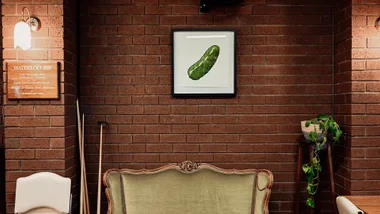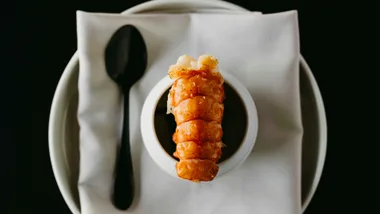It was a game of wine-bar snap when Embla and Marion opened within months of each other. Both are headed by acclaimed restaurateurs: The Town Mouse‘s Christian McCabe and Dave Verheul at the former; Andrew McConnell at the latter. Both have wine lists that showcase small producers and minimal intervention; both have a French connection; both emphasise that they’re bars first and foremost (Embla doesn’t take bookings), though their short, sharp menus of wine-focused food are certainly a major part of the appeal.
Given the match-up, it’s tempting to sift the tea leaves for signs of a new epoch in Melbourne dining. Established players taking it down a notch? A Parisian influenced wine bar in every stable? Wine bars with food morphing into food bars with wine? But Embla and Marion are each so immediately familiar the game-changer argument runs out of puff early on.
What’s happening here, then, is more a fine-tuning, an evolution even (if you want to get really portentous) of one of Melbourne’s long-standing dining strengths: the flexible, well-designed, mid-priced diner. Think Bar Lourinhã, Izakaya Den, Kirk’s Wine Bar, The Carlton Wine Room. Embla and Marion are not reinventing the wheel, but they are, by honing their focus, giving it a rather thrilling new spin.
You could argue that The Town Mouse, all bar-style seating and flexible, shareable menu, has a touch of the wine bar about it, making Embla simply an offshoot. But where Verheul’s Town Mouse dishes have a multi-ingredient, restaurant-like complexity to them, his food at Embla is simpler and more comforting, readier to cede the limelight to the wine.
This isn’t to say there’s not precision and ambition here. That much is immediately apparent in Verheul’s sublime roast chicken. It’s a halved, mostly boned (apart from the leg) and salted 10-week-old free-range organic bird from Milawa Poultry, which is cooked to order with rosemary and whole cloves of garlic in a cast-iron pan in the wood-fired oven. It comes with a deeply satisfying chicken sauce made from the bones and a simple gremolata and is as fine and juicy a bird as you would find in any restaurant in town. It’s roast chicken to make you misty for times when eating chicken was exceptional, not expected.
This simple, finely balanced, ingredient-focused approach never wavers. It’s there in plump Spanish anchovies paired with cultured butter, shallots and parsley on toasted house focaccia. It’s there in steamed local mussels that are pickled in mussel juice mixed with sherry vinegar and then served with a punchy pale orange rouille flavoured with saffron, paprika, chilli and caramelised garlic. It’s there in the surprising, scintillating mix of soft rags of stracciatella cheese mixed with chamomile-infused oil and fermented fennel, and with a sneakily boozy dried-peach rum baba served with a white chocolate Chantilly. And it’s certainly present in half-heads of broccoli, wood-roasted till the florets are crisp and charred, combined with a lemon-driven dressing flavoured with miso and sunflower seeds.
Having a wood-fired oven and grill as centrepieces is as much a statement of intent as an aesthetic at Embla. The oven, a hefty custom-made, rustic-looking iron thing, is the heart of the open kitchen. Watching the chefs – either from the stools that line the kitchen bar or the tables arrayed in front of it – slide small doors open to reveal glowing coals or to push about cast-iron pans in its depths adds an attractively primal note to the experience of eating here.

Embla’s roast chicken
Add a room that’s all dark colours – including a sleek black leather banquette at the back of the long narrow room and a grey stone-tiled floor – plus moulded timber joinery and an assortment of vintage light shades that add some subtle, unironically comforting elements and you have an ideal, meticulously constructed rustic backdrop for Embla’s other main event: the natural wine.
McCabe’s wine list at The Town Mouse has always been liberally seasoned with the minimal intervention stuff, but at Embla he goes all out. It’s a logical choice, both given his own predilections and those of his other partner in Embla, Eric Narioo, a UK-based French wine merchant, bar owner and champion of the minimal-interventionist cause for decades.
The Embla list has a strong focus on small Australian producers – attractively effervescent Gentle Folk Pink Fizz from the Adelaide Hills, elegant Save Our Souls chardonnay from the Yarra Valley, supple, floral Sanskrit gamay from the Huon Valley – but there are also plenty of European labels. Many of them are from producers using age-old varieties and technique – Denis Pommier, Farnea, Philippe Tessier – which emphasise, as the wine list points out, that if natural wine is “trendy”, “it’s a trend that’s been around for about 6000 years so far”.
For the dubious, the Embla list contains plenty of stuff that’s exciting to drink. Combined with McCabe and his staff’s signature unpretentious, sermon-free approach and some beautifully crafted wine-friendly food, it allows Embla to straddle the traditional and the edgy in a thoroughly appealing way.
Marion’s wine list, meanwhile, runs to around six pages, but has the considerable added heft of next-door neighbour (and sibling) Cutler & Co’s substantial cellar on offer as part of the wine bar’s package. The larger list can be a little daunting but service is one of Marion’s notable strengths, and guidance is never far away when all those pages of labels begin to swim before your eyes.
Manager Andrew Joy leads the charge and sets the relaxed, confident tone of the place – a feeling that’s maintained even when the two-room Gertrude Street shopfront is heaving. Joy is a good one to ask for wine advice (Cutler sommelier Liam O’Brian, working across the two venues, is no slouch either) and his catholic tastes mean he’s as likely to suggest a glass of classic small producer Champagne (JL Vergnon) as he is to recommend a locally produced minimal-intervention number (LAS Vino Portuguese Pirate from Margaret River) or a locally brewed beer (Hawkers Pilsner from Reservoir).
It’s a something-for-everybody approach, particularly if everybody is enthused about interesting wines made with passion, no matter where on the natural-classic-traditional spectrum they sit or from which part of the world they hail.
The depth of the wine list throws a broad challenge to the kitchen, particularly when the menu has been limited (literally, by a beautifully designed steel and timber pegboard with a finite amount of space) to around 16 items, including dessert, cheese and oysters.
There’s a lovely concision to the dishes at Marion that’s borne by the luxury of truly great ingredients. A one- or two-bite snack of spanner crab meat mixed with crème fraîche, celery seed and lemon zest is topped with Avruga and sits on a thin, fried piece of rye cracker. Fresh sea urchin and pickled muntries are cupped in a crisp squid-ink-flavoured tapioca cracker. Steamed mussels, meanwhile, are turfed out of their shells, mixed with mint, parsley and strips of zucchini, dressed with a shiraz vinaigrette and then topped with parsley oil and fiery fried crumbs of ‘nduja. House-made casarecce is tossed with chicory leaves and stems, sliced chilli and chilli oil and then topped with a deep-yellow tumble of grated cured egg yolk, while thinly shaved mortadella and ox tongue lie under a pale sprinkling of freshly grated horseradish. A tart filled with mascarpone and yoghurt and topped with halved, pitted fresh cherries comes with a cherry sorbet, made from blitzed whole cherries, including the stone, which adds a pleasant note of marzipan flavour to proceedings.
The simple-luxury approach of the menu is mirrored in the room. The concrete floor and rough-hewn brick walls (now whitewashed), remnants of the space’s former industrial life as a factory, are joined by leather, copper, marble and black powder-coated steel details. In one room there’s a copper-coated modular bar, more like a rounded hub than a traditional linear counter, in the other an open kitchen with a terrazzo pass. Indoor plants soften the hard surfaces and excellent lighting – up- and back-lighting mostly – casts the crowd in a most flattering light indeed.
The similarities between Marion and Embla run the gamut from coincidental to ideological. But despite them being members of the same “wine bar with food” club, the depth of talent involved in each place means that the outcomes are unique. That they emerged about the same time may not indicate that Melbourne is about to witness a new wave, but with food, wine and service this good, we should all be wishing and hoping that it did. We are certainly the richer for both of them, regardless.











